Samaaro + Your CRM: Zero Integration Fee for Annual Sign-Ups Until 30 June, 2025
- 00Days
- 00Hrs
- 00Min
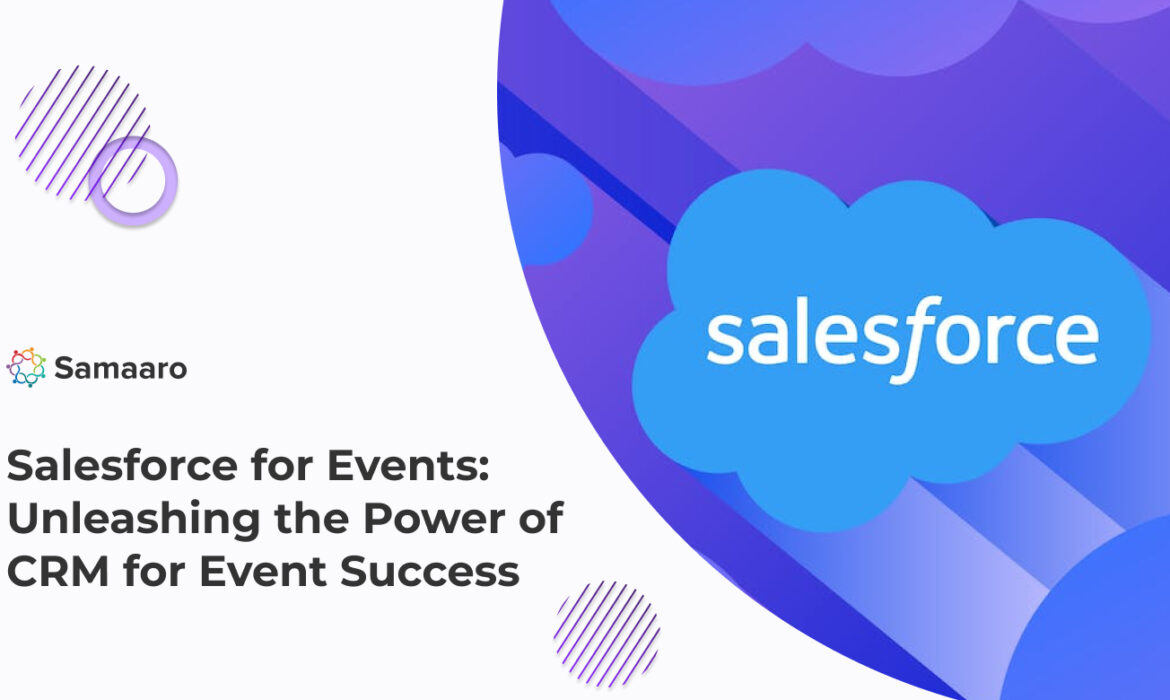
Salesforce is an incredibly powerful Customer Relationship Management (CRM) software that has transformed how businesses manage customer interactions, sales, and marketing efforts. Salesforce’s versatility has become applicable to the events industry as well. What Salesforce can do, is merge event planning, marketing, sales, and attendee engagement seamlessly!
By utilizing Salesforce to its fullest extent, event planners can manage leads, automate your marketing campaigns, manage your event performance effectively and enhance the customer experience and engagement of attendees. Through this blog, we are exploring how Salesforce can help you to achieve successful events and higher ROI.
I. Managing Leads with Salesforce
Lead management plays a vital role in maximizing event ROI. Salesforce provides many tools for lead capturing, scoring, nurturing, segmentation, and tracking that enable teams to convert event attendees to customers.
Effortless Lead Capture
Salesforce can integrate with event registration forms, mobile apps, and on-site check-ins to:
Having a 360 degree view of every attendee helps a sales and marketing team know how to best make a move.
AI Lead Scoring
If leads are appropriately prioritized, sales teams spend time addressing the leads that will make the most significant impact. Salesforce’s AI lead scoring allows lead to have
Having this information, the sales team can identify the leads around interest for personalized follow-up.
Automated Lead Nurturing
After the event, it’s all about keeping the leads engaged and taking action to drive conversion. Salesforce gives users automation tools that allow for
With automated workflows, event planners will be able to keep leads warm while also ensuring sales teams are not constantly following up with leads manually.
Advanced Lead Segmentation
Salesforce allows event planners to separate leads into meaningful segments for more targeted follow-up such as:
With leads segmented by behavior and characteristics, marketing can deliver more vibrant campaigns and sales will have better pitches.
Visibility into Real-Time Lead Progression and Sales Collaboration
Salesforce’s lead tracking and reporting tools give full transparency into attendees on their journeys from registration to post-event action. Key benefits include:
Sales teams and marketing will be all on the same page by using Salesforce which will help speed the conversion.
Tracking Sales Opportunities in Salesforce
In addition to lead management, Salesforce gives event organizations tracking tools to monitor all revenue opportunities as they are generated (tickets, sponsorships, exhibitors, and partnerships).
Visibility into the Entire Opportunity Cycle
Salesforce allows groups to see all stages of sales from initial stages to closing the deal. Key features include:
By organizing sales opportunities in Salesforce, event teams can ensure that opportunities for revenue are not missed.
Real-time pipeline visibility with the pipeline tools in Salesforce, event teams can:
Customizable sales reporting Using Salesforce’s reporting capabilities, event teams can:
With custom reports, sales teams can always be looking at their techniques to improve upon their return on investment (ROI).
Seamless integration with Sales Cloud Salesforce
Sales Cloud helps event teams ensure that sales-related data from events flows effectively between teams:
This integration improves efficiencies and ensures sales opportunities are not missed.
Dynamic Dashboards for Data Visualization
Salesforce dashboards enable event teams to visualize, track, and analyze data across multiple metrics and KPIs.
Salesforce dashboards help event planners remain data-driven in their efforts for event revenue management.
Automating Event Marketing Tasks with Salesforce
Marketing automation in event marketing is targeted at scaling your outreach and increasing attendee engagement that leads to a conversion outcome. Salesforce has tools powered by automation to help event teams expand their marketing planning and execution and allows them to measure their success for accountability.
Automated Email Marketing:
Salesforce has automated email campaign capabilities to ensure event managers are communicating to their attendees before, during the event, and after it is planned. Key elements of benefits include;
Having an automated (email) workflow would allow you to automate all the attendee email communication phases to keep the attendee experience engaged and increased follow-ups
Social Media Management
Salesforce allows event teams to structure and manage their social media communication and promotions for their events while in one place.
Adding social media tracking into Salesforce will be easy and will be less thinking for event marketing teams while engaging with audiences across various formats!
Marketing Analytics / Measuring Campaign Effectiveness
Improving and optimizing event marketing to be effective and tracked on campaign effectiveness by using Salesforce would support event marketers in;
Event marketers will not have to guess if the marketing tactics they used functioned.
– Automating Automated Workflows
Salesforce allows event marketers to automate that will save time and manage ongoing duties/tasks as well:
Will make the system easier to keep the workflow as attendees are grouped accurately.
By having repetitive tasks automated, you are going to give some time back to dying both as well put that time into strategy, initiatives, and delivering an incredible attendee experience.
Tailored AI Personalization
Salesforce employs intelligent AI and its capabilities will provide;
AI-powered personalization maximizes attendee engagement and fosters and amplifies outcomes like event conversion rates that are persistently focused on your stakeholders.
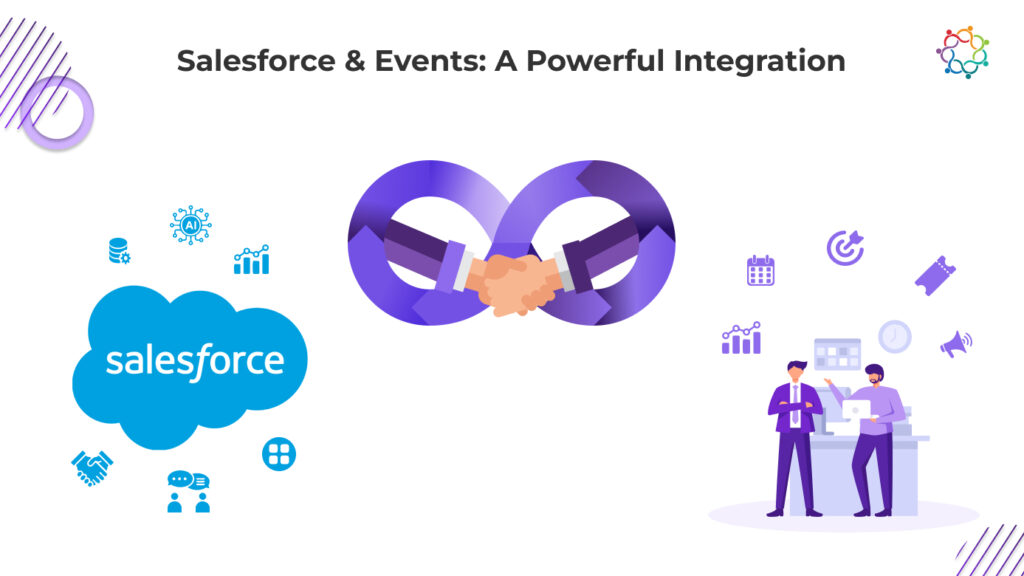
When Salesforce is seamlessly integrated with your event technology, you end up getting a good experience for everyone involved; the attendees, the organizer, and the sales team. When businesses tie together Salesforce and event technology tools, they can bring data together, operate more efficiently, and enhance engagement.
Integrations with Event management Platforms
Event management platforms such as Cvent, Bizzabo, and Eventbrite offer a variety of options for integrating with Salesforce. Integrations provide you with the ability to:
In regards to event management platforms, integration with Salesforce equals efficiency and removes data silos.
Integrations with Mobile Event Apps and On-Site Engagement tools
By integrating with mobile event apps, and after event management processes, staff will obtain real-time insight on attendee engagement and track engagement interactions, including:
Integrating mobile event apps ensure that everything an attendee interacts with is logged as event interactions, thereby creating a better basis for personalized engagement.
Integrating Marketing Automation Tools
When linking your marketing automation tool platforms like HubSpot, Marketo, or Pardot, to Salesforce provide operational enhancements for better market events by:
With promotional solutions, the event team can streamline lead collection and improve conversion.
Data Moving Through Systems
When event tech and Salesforce share data flow, it can:
Having all data flowing in one complete ecosystem allows for better fundamental decisions and better execution of events overall.
API’s and/or Customized Event Tech
Salesforce APIs provide organizations with the ability to connect to customized software and/or third-party event tech solutions by enabling:
Using Salesforce APIs allow organizations to build custom scalable event tech solutions that measure directly to their goals.
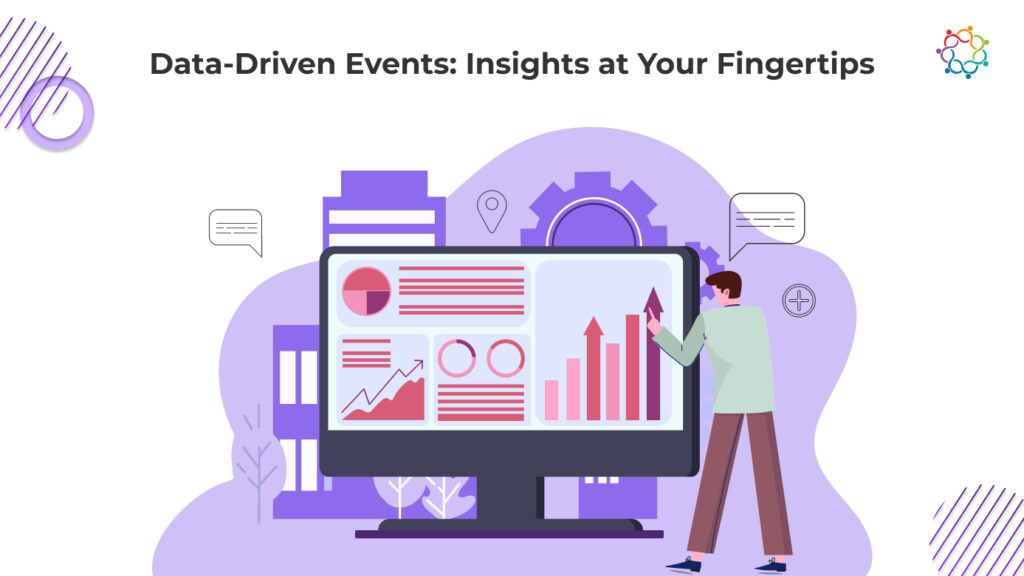
Data is at the core of a successful event, and Salesforce is equipped with strong reporting and analytics capabilities to help the event planner measure, refine, and get the most return on their investment.
Customized Reporting for Event Data Insights
Salesforce will allow your organization to create reports based on:
Attendee Patterns: Attendance at sessions, level of engagement, and opportunities to network.
Lead Conversion: Track the intended path from a lead being seized to it converted, as well as the touchpoints along the journey.Sponsorship Performance: Measuring sponsor visibility, audience engagement, and lead generation.
Event Metrics: Participation, ticket, engagement accords.
By having access to important event analytics in real-time, event organizers can make informed event decisions to improve their next event.
Event Data Visualization for Real-Time Positioning
Salesforce dashboards allow teams to:
Track KPIs: Monitor registration numbers, session attendance levels, and lead engagement, all in an interactive environment.
Understand Event Performance in 360°: Utilize real-time visual reports to capture a moment in event success.
Look for improvement opportunities: Identify attendee vendor engagement behavior and track a more effective marketing approach.
If event teams can visualize their data, they will be able to comprehend complex information using raw data and identify areas where they can act.
ROI Assessments for Event Planning
Salesforce ROI Assessment Tools help organizers:
Determine Campaign Performance: Measure marketing effectiveness comparing the success/ROI of pre-event campaigns across numerous outlets (channels).
Understand the Performance of the Sponsor/Sponsorship: Analyze sponsor visibility and engagement to develop the sponsorship package.
Drive Better Budget Decisions: Utilize data insights to plan spending in areas previously yielding positive returns and removing)or attempting to prevent investment in less effective return producer.
By analyzing event ROI on a continuous basis, organizations can improve financial accuracy and guarantee the long-term success of the event.
Data-Driven Best Practices for Continuous Improvement
Using Salesforce analytics will allow event organizers to:
Improve Audience Engagement: Analyze attendee engagement data to determine the level of experience you provided; personalize and simply engage with more attendees.
Improve Planning of future events: Use previous event insights to better plan their subsequent events: venue choice, session topics and content delivery.
Enhancing Sales and Marketing Alignment: Ensure that your sales and marketing teams are leveraging data to continuously optimize their lead tracking and conversion processes.
Real-time analytics allow your event marketing teams to continuously shift their activities.
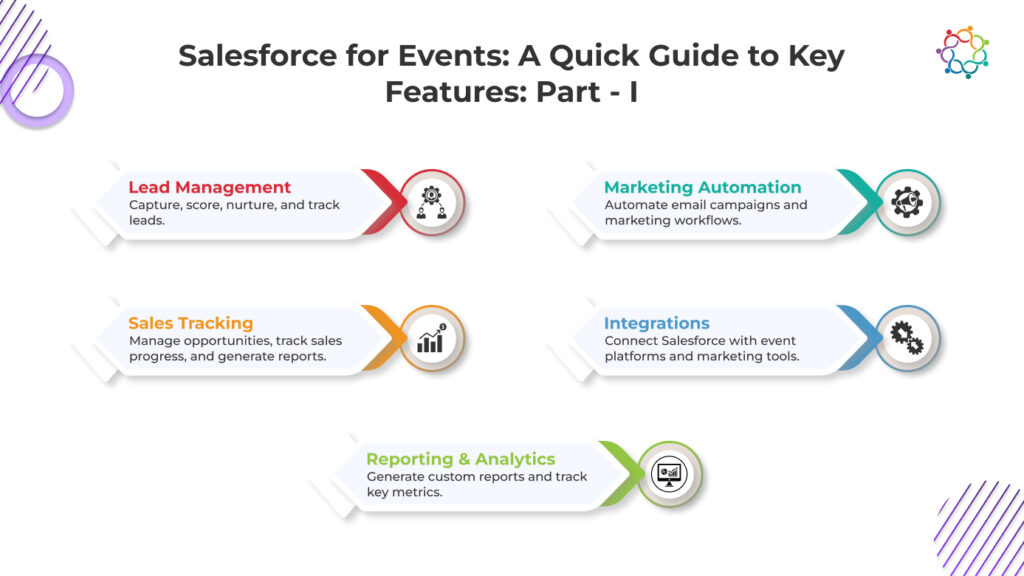
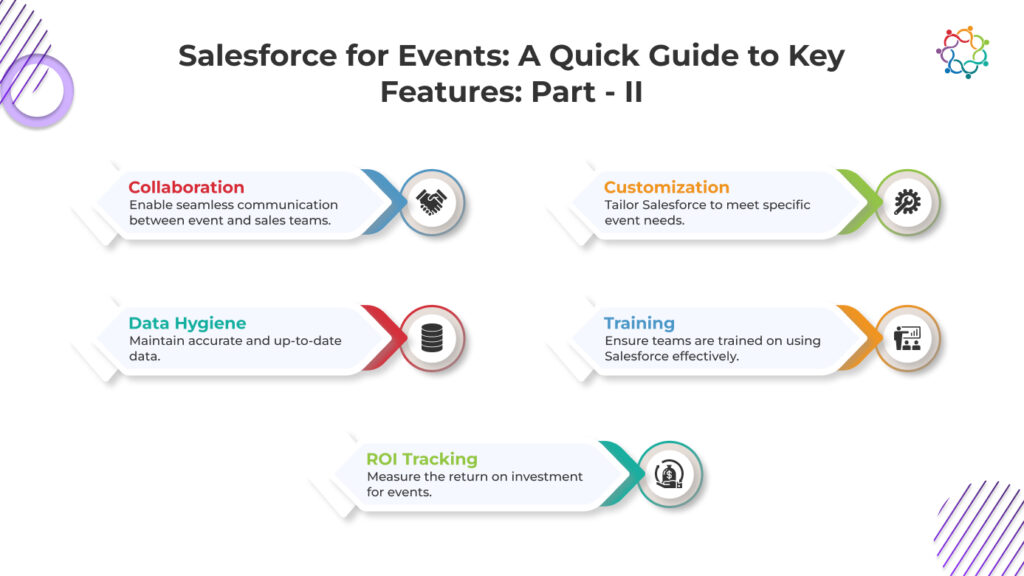
Organizations can utilize best practices to help them take advantage of Salesforce as well as provide teams with effective workflows, better data accuracy, and ultimately overall effectiveness.
1. Data Hygiene:
2. Training and Adoption:
3. Customization:
4. Integration Strategy:
5. Ongoing optimization:
Utilizing these best practices will allow your organization to fully maximize the effectiveness of using Salesforce in your strategy around events.
Conclusion
Salesforce is an absolutely game changer for event planning and event management for organizations around lead capture, optimizing marketing automation, sales alignment, and so much more; real-time analytics is what allows your event planners to increased engagement, improved efficiencies, and ultimately better revenue. We at Samaaro, know the need for organizations to leverage CRM technology to rethink their event strategy. Request a demo or start your free trial today to see how Samaaro can change your event experience for the better.

Built for modern marketing teams, Samaaro’s AI-powered event-tech platform helps you run events more efficiently, reduce manual work, engage attendees, capture qualified leads and gain real-time visibility into your events’ performance.
Location
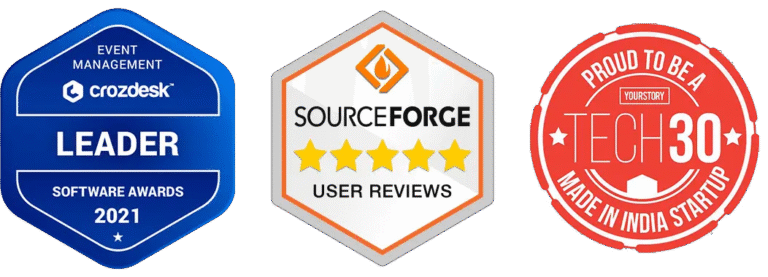
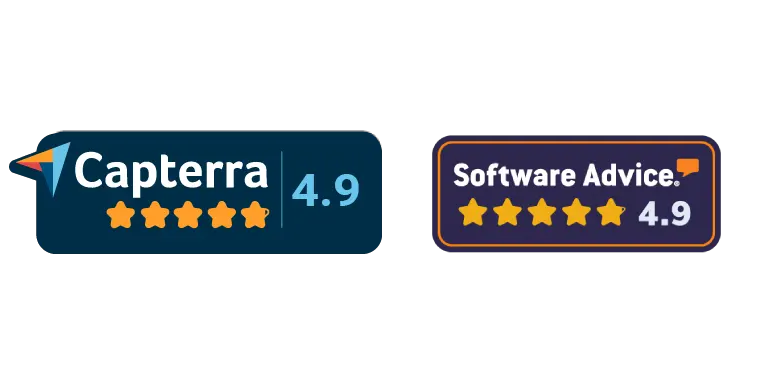
© 2026 — Samaaro. All Rights Reserved.